America may already be in a recession and people could see their economy shrink by a seasonally-adjusted annualized rate of 6 percent in the first quarter of 2020, and by a jaw-dropping 24 percent in the following quarter, according to a new analysis from Goldman Sachs.
In the event Goldman’s prediction for a Q2 tumble of 24 percent holds, it would make it the biggest single-quarter drop in the history of U.S. gross domestic product (GDP), as it is now measured.





